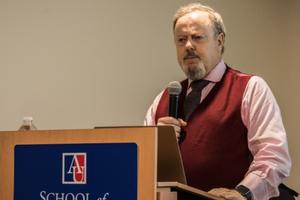On Campus
Leading Scholar Shares His Insights on Brexit and Northern Ireland

The unfolding Brexit drama since the United Kingdom voted “Leave” in 2016 begs the question: why can’t the country get on with it and just leave the European Union already?
It’s not that simple, explained Brendan O’Leary, Lauder Professor of Political Science at the University of Pennsylvania, at a recent lecture co-sponsored by the AU School of Public Affairs (SPA), the Irish Embassy, the Northern Ireland Bureau and the EU Transatlantic Policy Center in the AU School of International Service.
“If you hear anybody saying let’s just get Brexit done, they are proposing an illusion,” said O’Leary. “The future relationship will be negotiated after the withdrawal agreement has been ratified and that is almost certain to take a very long time. The idea that there will be a future trade agreement concluded quickly is not feasible.”
In his remarks, O’Leary outlined the political landscape leading to the unexpected Brexit decision, the ongoing struggle for a path forward, and the potential fallout if the country severs ties with its 27 trading partners in the E.U. As the 2016 referendum loomed, political rhetoric focused on the exit itself, without informing voters about the economic or legal consequences or carefully considering alternative pathways, O’Leary said. Leaving would involve withdrawing from the customs union and the single market, and, in the eyes of many, marked the end of freedom of movement among European countries.
“Hostility to migration weighted heavily on the vote,” said O’Leary. “The referendum exposed deep fissures inside the United Kingdom - most important, the difference between the four constituent units.” Majorities in Scotland and Wales favored remaining, while provincial England and Wales came out strongly in favor of Brexit.
O’Leary suggested that the dissolution of the larger union may trigger the breakup of the U.K.’s constituent nations of England, Wales, Scotland, and Northern Ireland. While Brexit has resulted in a more fractured U.K, the crisis has left the rest of the E.U. more cohesive and solid. The political and geographic situation in Northern Ireland, namely its border with the Republic of Ireland, poses a particular challenge. U.K. Prime Minister Boris Johnson has introduced special provisions allowing Northern Ireland to remain in the EU’s single market and customs union, but the details remain unclear. Additionally, Brexit might affect the power sharing arrangement in Northern Ireland, including modification of the Good Friday Agreement.
O’Leary also described the “curious double intervention” of U.S. leaders in Brexit negotiations. President Trump reversed decades of U.S. policy by inserting himself in the political fray and publicly favoring Brexit, while some Congressional Democrats weighed in to warn against the potential ramifications for Northern Ireland.
As the complications of leaving reveal themselves, public sentiment has shifted away from Brexit - not because voters have significantly changed their minds––but because more young people have been added to the electorate, said O’Leary.
After the lecture, SPA Professor Saul Newman said he was impressed with the student participation; they asked O’Leary deep theoretical and empirical questions about Brexit. “It’s a wonderful opportunity to have a leading scholar who has published more than anyone else on Northern Ireland come speak about issues that are not really in the popular press - not just how Brexit will happen, but the implications for the rest of the United Kingdom, which is really important,” Newman said.